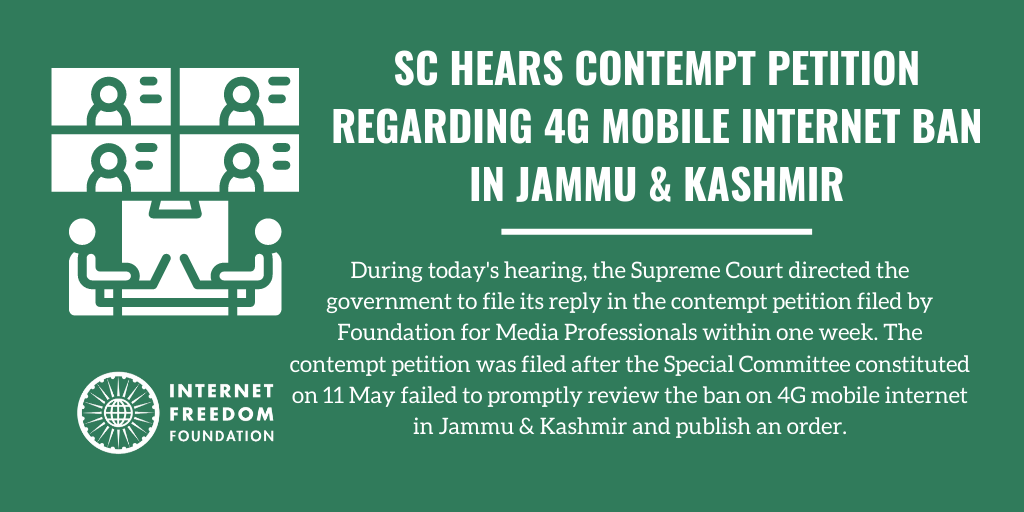
Tl;dr
The Supreme Court has directed the Ministry of Home Affairs and the Government of Jammu & Kashmir to file its reply in a contempt petition filed by the Foundation for Media Professionals within one week. The contempt petition was filed after the Special Committee constituted by the Supreme Court on 11 May 2020 failed to promptly review the ban on 4G mobile internet in Jammu & Kashmir and publish a reasoned order.
Background
On 11 May 2020, the Supreme Court delivered its judgement in a petition filed by the Foundation for Media Professionals (FMP) seeking restoration of 4G mobile internet services in Jammu & Kashmir during the COVID-19 pandemic (Read more here). The Court constituted a Special Committee comprising (i) Secretary, Ministry of Home Affairs, (ii) Secretary, Department of Telecommunications, and (iii) Chief Secretary, Government of Jammu & Kashmir to immediately review the 4G mobile internet ban. In particular, the Special Committee was directed to examine the material placed on record by all parties and consider the viability of less restrictive alternatives suggested by the petitioner.
Since the constitution of the Special Committee on 11 May 2020, four orders have been issued by the government under the Telecom Suspension Rules 2017 to extend internet restrictions in Jammu & Kashmir. The most recent of these orders was issued on 08 July 2020 and it directs slowdown of mobile internet speed in Jammu & Kashmir to 2G till 29 July 2020.
The contempt petition was filed by FMP on 09 June 2020 since there was no information available in the public domain about the Special Committee. In particular, there was no information about whether the Special Committtee had been constituted, whether it had held any meetings, whether it had reviewed any of the orders issued by the government or whether it had arrived at a decision. Prior to filing the contempt petition, FMP had also sent two representations to members of the Special Committee urging them to comply with the directions of the Supreme Court but it did not receive any response (Read more here).
What happened during today's hearing?
During the hearing, Senior Advocate Huzefa Ahmadi appearing for FMP explained the timeline of events and highlighted the Special Committee's non-compliance with the Supreme Court's direction to immediately review the internet restrictions in Jammu & Kashmir. He emphasized that there was no information available in the public domain about the workings of the Special Committee and this went against the spirit of Anuradha Bhasin v. Union of India where it was clearly held that orders must be published to allow an aggrieved person to challenge them before courts (Read more here). He also highlighted the suffering of the people in Jammu & Kashmir who are being deprived of telemedicine and online education during the COVID-19 pandemic while the rest of the country enjoys these facilities.
Attorney General KK Venugopal and Solicitor General Tushar Mehta appearing for the government insisted that the Special Committee had complied with the Supreme Court's directions. The Attorney General stated that the Special Committee had been constituted and it had held two meetings so far on 15 May 2020 and 10 June 2020. He further claimed the Special Committee was examining the impact of internet restrictions on education, health, business activities and freedom of speech. However, since there has been a rise in terrorism in the region, the Special Committee decided to defer the issue for two months after its last meeting. Finally, he offered to place the minutes of the meetings of the Special Committee before the judges in sealed cover. This means that the petitioner would not be allowed to have access to the minutes of the meetings.
After hearing oral arguments from both sides, the three judge bench consisting of Ramana J., B.R. Gavai J. and Subhash Reddy J. directed the government to file its reply on affidavit within one week.
FMP was represented in today's proceedings by a legal team led by Senior Advocate, Huzefa Ahmadi and consisting of Advocates Shadan Farasat and Bharat Gupta and IFF associated counsels, Vrinda Bhandari, Apar Gupta, and Devdutta Mukhopadhyay.
